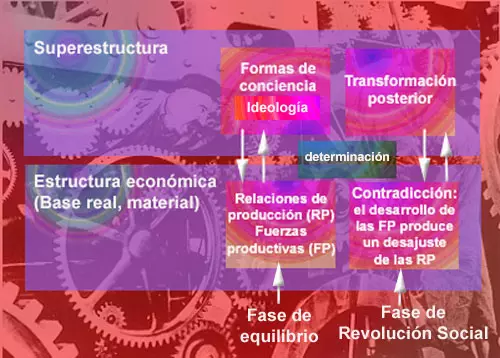It is a mistake to say that Marx materialism is based on the affirmation 'everything is matter'. Indeed, Marx refrains from making metaphysical claims in that sense. Thus, the materialism he postulates has a practical significance that simultaneously opposes the idealism of Hegel but also the materialism 'classical'.
The priority of being over thought: against Hegel, Marx} is placed in a position close to Feuerbach who criticized Hegel for having turned man into pure spirit instead of considering him a real and concrete being.
Dialectic materialism: Democritus and the 18th century French materialists represent the classical materialism that Marx will criticize for considering it abstract and mechanicist, reducing matter to mechanical laws (strict mechanicism seemed surpassed by 19th century science with chemistry, biology and theory of evolution). It will also point out that classical materialism lacks a dialectical and historical character. But the most important differential aspect is that it considers reality only as an object of contemplation, since thinking is posterior to being and ideas are pure reflection of reality in such a way that man is passive and contemplative.
Thus:
Against idealism: Affirms the independence of outer nature from thought.
Against mechanistic materialism and Feuerbach: he states that it is not possible to separate Nature from man. Man is not contemplative but active, he transforms nature and real nature is transformed by man so that it enters into historical becoming.
The historical materialism of Marx presupposes the negation of the autonomy of ideas with respect to the conditions of human existence and also the dialectical and historical character of that material basis. Engels defines it as follows:
The conception of universal history, which sees the final cause and the decisive driving force of historical events important in the economic development of society, in the transformations of the mode of production and change, in the consequent division of society into different classes, and in the struggles of these classes among themselves Engels, From Utopian Socialism to Scientific Socialism.
Engels, in fact, considers that Marx is the creator of this materialism and (together with the theory of surplus value) forms his greatest scientific finding. In fact, it is not a philosophical theory but a sociological one.
 1. The economic structure is the real basis of society.
1. The economic structure is the real basis of society.
This structure consists of the bases of production, which are the relationships that are established between men according to their situation in relation to the forces of production. Legally they are expressed through property relationships. Within a capitalist system, the bourgeoisie owns the means of production, and the worker possesses only the labour force (relations that are different in a regime of exclavitude or servitude)
The productive forces are given by labor and means of production. The productive forces move within the framework formed by the relations of production.
The economic structure determines or conditions a superstructure consisting of the forms of consciousness or ideological forms that are but the combination of representations (ideas, myths, symbols) and values of society at a particular moment. The dominant ideology at all times corresponds to the idelogy of the ruling class in such a way as to justify the economic structure of that moment.
The conflict appears in function of the normal development of the productive forces, which no longer find an adequate context but only problems in the relations of production. Thus appears the phase of social revolution that will transform the ideological superstructure. Marx postulates that the development of the capitalist system of production inevitably leads to the overcoming of bourgeois society and private property.
It is not the reason that drives history as Hegel points out, but is driven mainly (though not exclusively) by the forces of production, especially human labor. In short, men are the beginner actor of history, a story that can only advance through contradictions and struggles. And in that struggle, consciousness fomras (class consciousness) plays a significant role (though not exclusive or priority)